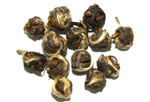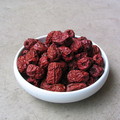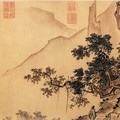Jasmine tea
„Jasmine tea (Chinese: 茉莉花茶; pinyin: mòlìhuā chá) is a type of scented tea which absorbs aroma from jasmine blossoms. Scented tea was known during the time of the Song Dynasty (960–1279); however it was reserved for the Imperial Court. Typically, jasmine tea employs green tea as the tea base; however, white tea and even black tea are also now used. The resulting flavor of jasmine tea is subtly sweet and highly fragrant. It is the most famous scented tea in China.“

Quotes Tags: Jasmine Tea
Theme
Tea by region
We will help you with tea selection.
Do you like quality loose tea?
We will help you to find the right one for you. Be inspired by tea ratings of other tea lovers. Rating stars could help you.


Review your cup of tea.
Review the tea you are drinking and help other tea lovers to find the right cup of tea.



Teas
2010 Longchang Puer Brick 100g
 1 review
1 reviewShu brick 100g brought from China as a present. Unknown seller. Producer is LongChang Tea Co.
2006 Changtai Long Ma Rui Ming "Dragon Horse"
 1 review
1 reviewThis cake is composed of Lancang and Menghai area selected materials.After 5 years aging in dry storage,...
2008 Xiaguan FT Xizi (Happy) Tuo Cha Raw 100g
 1 review
1 reviewXizi tuo is one of famous Xiaguan Fei Tai products. Used high quality blend of 1-3 years aged materials and...
Quotes
„hong qing; 烘青. Oven dried. Oven dried tea is generally felt to be inferior to sun-dried. However, most tea producers have one, often wood fired, oven, which is used to dry leaves if time or weather does not permit sun or air drying. “



 Shops
Shops Share on Facebook
Share on Facebook












